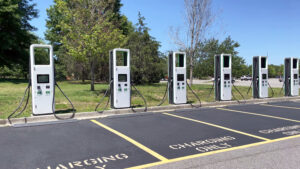
EV & alternative fuels infrastructure: Ohio tackling both, Louisiana passes bill on EV charging
By onAssociations | Market Trends | Technology
Clean Fuels Ohio (CFO) and other stakeholders gave an update Wednesday on progress made in building out electric vehicle (EV) charging and compressed natural gas vehicle fueling infrastructure along the I-80 corridor within Ohio. 
There is $7.5 billion in federal funding available for the I-80 Mid-America Alternate Fuel Corridor Project, which is the result of the U.S. Department of Transportation’s Federal Highway Administration (FHWA) designation of I-80 as an alternate fuel corridor from New Jersey to Iowa. The designation was made in 2016 under the federal Fixing America’s Surface Transportation Act (FAST) Act, according to Argonne National Laboratory Transportation Principal Environmental Analyst Marcy Rood.
Eventually, all 2,900 miles of the corridor will be connected from state to state with EV charging and alternative fuel infrastructure. Argonne is currently working with New Jersey, Pennsylvania, Illinois, Indiana, and Iowa in addition to Ohio. The ultimate goal is to connect the entire country with EV and natural gas infrastructure, Rood said.
Tasks of the 1-80 project include:
-
- Develop deployment plan for compressed natural gas (CNG) and direct current fast charger (DCFC) infrastructure on the eastern portion of I-80;
- Flip corridor segments from CNG and EV “pending” to CNG and EV “ready;” and
- Identify new locations for CNG stations and DCFC infrastructure and the funds to support their deployment.
To date, Clean Fuels Ohio has worked on outreach to stakeholders including potential fleet adopters, municipalities, metropolitan planning organizations (MPOs), and others. CFO began working with Intertrust in October 2021 to map out future DCFC stations. 
There are currently five DCFC stations along the corridor that meet Infrastructure Investment and Jobs Act (IIJA) requirements to include simultaneous charging for four 150-kilowatt chargers and a minimum station power capability at or above 600 kilowatts, according to CFO Grant and Program Manager Jenna Ellingson. The IIJA also requires that stations be installed every 50 miles and within one mile of the interstate.
CFO has also built a CNG station in Girard and another one is planned for the eastern side of the state.
Part of the project, and its funding, comes from Ohio’s stake in the National Electric Vehicle Infrastructure (NEVI) Formula Program to build out a national charging network. State plans are due for it on Aug. 1 and FHWA plans to approve them by Sept. 30.
CFO also worked with state senators to write a bill to train Ohio’s workforce and retool auto factories and shops for EV production and repair with a proposed $25.75 million a year. It was introduced in March and remains in committee.
Senate Bill 307, known as “Accelerating Ohio’s Auto Industry,” or AOAI, focuses on preparing for the expected influx and popularity of EVs, including battery electric vehicles (BEVs), plug-in hybrids (PHEVs), and hybrids by creating three programs – one focused on incentives, another on retooling and equipment, and a third on training and modernization. It also addresses EV charging infrastructure creation and electric grid support.
For more information about the I-80 corridor project or about other Clean Fuels Ohio initiatives and resources, contact CFO Consulting Services Manager Brandon Jones via email at Brandon@CleanFuelsOhio.org or Ellingson at Jenna@CleanFuelsOhio.org.
Also on Wednesday, a bill in Louisiana passed the House that “seeks to open up investment opportunities to other companies by ‘urging’ the Public Service Commission to exclude vehicle charging stations from the definition of a public utility… [to] allow small companies, like those that own convenience stores and gas stations, to enter the vehicle charging market and make a profit off of charging stations,” according to the Louisiana Illuminator. Known as the “Electric Vehicle Charging Equipment Network Act,” the bill passed in the Senate on May 9.
The bill states, in part, that “The Louisiana Legislature hereby finds it necessary and in the best interest of the state to promote rapid development of a statewide electric vehicle charging network by… improving the quantity, quality, and variety of electric vehicle charging amenities and consumer experience services available in the state…”
Images
Featured image credit: Aranga87/iStock
Rood and Ellingson photos (Clean Fuels Ohio Zoom webinar screenshots)
More information
“Energy Zones Mapping Tool” – ezmt.anl.gov
“Electric Vehicle Charging and the Justice40 Initiative” – anl.gov/es/electric-vehicle-charging-equity-considerationshttps://www.anl.gov/es/electric-vehicle-charging-equity-considerations
Washington & Ohio legislators look toward EV future with new & proposed laws
